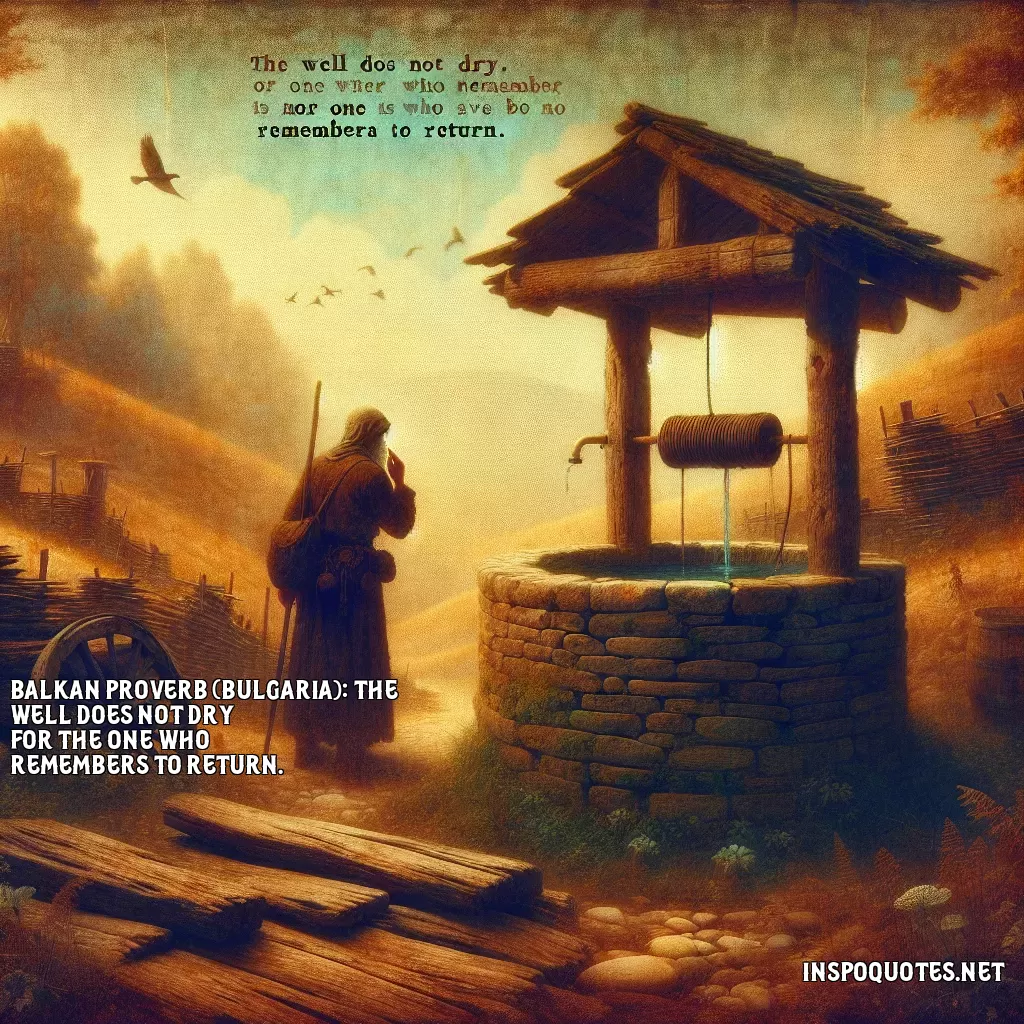
Balkan Proverb (Bulgaria): The well does not dry for the one who remembers to return.
Author: Bulgarian Proverb
👁️ 2 views

Balkan Proverb (Bulgaria): The well does not dry for the one who remembers to return.
👁️ 2 views
The Balkan proverb, "The well does not dry for the one who remembers to return," speaks to the importance of maintaining relationships, traditions, and foundations that sustain us. A well, in many cultures, symbolizes a source of life-sustaining water, representing stability, nourishment, and refreshment. Similarly, in our lives, there are critical resources—relationships, emotional supports, knowledge, and experiences—that we can rely upon. This proverb suggests that these resources remain abundant for those who remember to return to them, highlighting the significance of gratitude and consistency. When we frequently revisit or nurture what sustains us, whether it be our relationships with family and friends, the wisdom of past experiences, or cultural traditions, we ensure these sources remain active and sustaining. Ignoring them can lead to depletion and distance, much like a well that goes untended may eventually run dry. Therefore, regular attention and appreciation are necessary for sustainable nourishment. This proverb can also be applied more broadly to notions of community and passing down cultural traditions. By revisiting these shared sources of identity and strength, communities ensure they remain vibrant and avoid the metaphorical 'drying.' Returning to one's roots, so to speak, guarantees that there is always a source of support to draw from in challenging times. Thus, the proverb underscores the wisdom of remembering and cherishing one's foundational supports, ensuring they remain a reliable wellspring.
Quote By: Bulgarian Proverb
**Bulgarian Proverb: Wisdom Embedded in Culture**
Bulgarian proverbs are an integral part of the rich tapestry of Bulgaria's cultural heritage, reflecting the country's history, traditions, and values. These concise and often metaphorical expressions serve not only as wisdom passed down through generations but also as a means of preserving the collective identity of the Bulgarian people.
Proverbs hold a special place in Bulgarian folklore and daily conversation. They are often employed in literature, music, and storytelling, illustrating morals or offering practical advice in a culturally resonant manner. Traditionally, the Bulgarian people have relied on these sayings to encapsulate complex ideas simply and poignantly, demonstrating the depth of their observations about life, nature, and human relationships.
One of the most notable aspects of Bulgarian proverbs is their ability to convey universal truths through local experiences. For instance, a proverb like "A man without a beard is a man without a soul" reflects both a cultural notion of masculinity and the societal importance placed on physical appearance and identity. This particular saying embodies the way Bulgarian proverbs often intertwine personal identity with broader social values.
In the late 19th and early 20th centuries, during the period of national revival, the popularity and collection of proverbs surged, thanks to the efforts of scholars and folklorists. Authors such as Ivan Vazov and Petko Rachov Salchev played crucial roles in documenting these nuggets of wisdom, ensuring that they were not lost to modernity but instead celebrated and integrated into the national consciousness.
Additionally, Bulgarian proverbs frequently emphasize the interconnectedness of humanity with nature, guiding individuals to live in harmony with their surroundings. This is evident in proverbs that reflect agricultural wisdom, showcasing the agrarian roots of Bulgarian society. These sayings resonate deeply with a population that has, for centuries, been inextricably linked to the land.
In summary, Bulgarian proverbs are more than mere sayings; they are a vital expression of the Bulgarian spirit, with layers of meaning that speak to the heart of the culture. The study and usage of Bulgarian proverbs continue to flourish, serving as a bridge between the past and present, highlighting the wisdom of the ages captured in the simplicity of everyday language. Through this lens, one can appreciate how Bulgarian proverbs maintain their relevance, offering insights that transcend time and context.